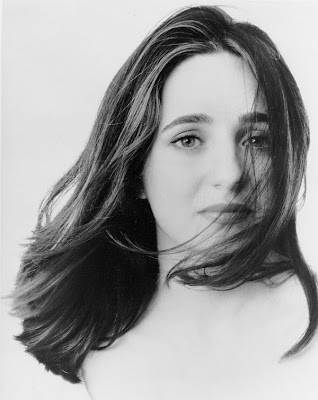This has been an incredible week of piano recitals, with performances by Lang Lang, Yundi Li, Mathias Soucek (we had to miss it, but here's the Post's review), Pierre-Laurent Aimard, and Alfred Brendel. To cap it off, last night Sharon Percy Rockefeller and WETA-FM's Friends of Classical Music hosted a special fundraising concert by Simone Dinnerstein, at Anderson House, the headquarters of the Society of the Cincinnati, on Embassy Row. Dinnerstein struck gold last summer when, relatively unknown, she released a new recording of the Goldberg Variations. The nice Brooklyn girl, trained at Juilliard, learns one of the most difficult pieces of the piano repertoire while she is expecting a baby. It was a human interest story ready for print, the press ran with it, and Dinnerstein's CD shot to the top of the sales charts. Last fall, Jens wrote about that recording, and I reviewed her in concert playing the Goldbergs.
As an introduction to Dinnerstein's abilities in front of an elite Washington audience, it was natural for her to play the Goldbergs again. She did just that, playing the second half of the set, which contains most of the ultra-challenging variations. Her approach to the work has not changed much in the time since making the recording or playing it live in Baltimore, and she made many of the same choices. The only difference, perhaps, was that the experience of playing for an intimate, semi-public concert gave her the daring to experiment with the extent of those choices, pushing the extremes one step further. Dinnerstein also observed the repeats with no concern for consistency, often appearing to choose to skip a repeat if the section had gone somewhat roughly.
As noted of her Baltimore concert, Dinnerstein was at her best in the delineation of contrapuntal voices. In her jolly, but not raucous reading of the Quodlibet (Variation 30), different snatches of the popular songs woven together by Bach popped out of the texture on the repeats. Sometimes, she drags out the tempo, as in the somnolent Variation 21, to enhance her ability to unravel the knot of voices. Fast tempo choices marked Variation 23 (clipped and spunky), 24 (a light-hearted dance), 26 (like an extended rush of wind), and 29 (a brilliant toccata, with the alternated full chords almost like a trill). One of my favorite things she has done in her performances is in Variation 28, where the 32nd note figures, which often dominate in other versions, are almost unheard whirrings of hummingbird wings.

Pianist Simone Dinnerstein, photo courtesy of the Piatigorsky Foundation |
As all Ionarts readers recall, WETA switched from its largely classical music format to all news in 2005, over the vocal opposition of the entire classical music community of Washington (a petition was signed by 740 musicians and music lovers, including composer John Adams and James Galway). It was a tragically bad decision that happily led to an embarrassing drop in ratings and loss of listener support. To everyone's relief, WETA returned to classical music last January and, even better, became even more exclusively devoted to it than before. It was with some (unwitting?) irony that Sharon Percy Rockefeller took note of the one-year anniversary of WETA's return to classical music, by saying, "We simply could not allow classical music to go off the air." Yes, it seems odd that WETA had no trouble abandoning classical music in 2005 but suddenly felt morally responsible in 2007, but it hardly matters, as long as classical music is on the public airwaves in Washington. That the station's ratings are going up is icing on the cake.
A brief conversation between WETA Vice President and General Manager Dan DeVany (who had fought so hard for the failed switch to the all-news format in the first place) and Dinnerstein followed the performance. She spoke about how she stays focused during a performance, even when something really distracting happens, as it did during this concert, as the sound system somehow began to pick up sounds from the kitchen. She credited her ability to concentrate to her childhood as a painter's child, when she had to pose for her father, sitting still for long periods of time. She also has found help in yoga and meditation techniques to keep herself calm and focused as she performs. As for her approach to the Goldberg Variations, she admits that she is not interested in Bach the man as much as she is in Bach's music, which she believes can best be performed on the modern piano, with its greater dynamic and expressively coloristic range. After saying that she admires Gould's 1981 recording of the Goldbergs more than the 1955 one, she made an interesting statement about being influenced by historically informed performance ensembles, by their sense of rhythmic freedom.
Simone Dinnerstein will give a free concert with cellist Zuill Bailey at the National Gallery of Art next month (April 27, 6:30 pm). The all-Beethoven program will include works from the duo's 2006 CD. Dinnerstein will also give her recital debut at the Kennedy Center next winter (February 7, 2009). It was also announced that Telarc will release Simone Dinnerstein's next CD, a live recording of her recent recital at the Berlin Philharmonie, in August. It will combine Bach's fifth French Suite, Beethoven's last piano sonata, and Philip Lasser's Twelve Variations on a Bach Chorale, sadly omitting, due to CD space, the variation sets by Aaron Copland and Anton Webern that were on the Berlin program.






















































No comments:
Post a Comment